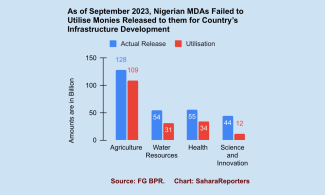
In 2020, the then-Director General of the Budget Office, Ben Akabueze, stated that unspent funds would be returned to the treasury by year-end, highlighting the inefficient use of resources and the need for improved fiscal management.
Despite the pressing need for development in Nigeria, government ministries, departments, and agencies are failing to utilise released funds, which are intended for infrastructure development and other capital projects.
In 2020, the then-Director General of the Budget Office, Ben Akabueze, stated that unspent funds would be returned to the treasury by year-end, highlighting the inefficient use of resources and the need for improved fiscal management.
In 2019, the House of Representatives urged Ministries, Departments, and Agencies (MDAs) to return unused funds to the treasury by December 31st of that year. This directive came after a motion was raised by the then-Speaker of the House, emphasising the importance of refunding unspent budget allocations.
An examination of budget performance documents reveals that various ministries, departments, and agencies failed to utilise over N260 billion allocated for capital development, according to the recently released budget performance report for Q3 2023.
Specifically, the agriculture ministry failed to utilize N19 billion out of the N128 billion released and cash-backed, with only N109 billion being spent as of Q3 2023, indicating significant underutilisation of funds.
The water resources ministry received N28 billion, but only utilised N21 billion. In the education sector, N54 billion was released, but only N31 billion was spent. The health sector received N55 billion, but utilised only N34 billion.
Meanwhile, the aviation ministry failed to utilize N15 billion out of the N20 billion released to it. The science and innovation ministry only used N12 billion out of the N44 billion allocated to it. The transportation sector fared slightly better, utilising N43 billion out of the N56 billion released to it.
The Ministry of Humanitarian Affairs and Disaster Management utilised N37 billion out of the N53 billion released to it, which was fully cash-backed. The Defence Ministry spent N180 billion out of the N189 billion allocated to it as of Q3 2023. The Police Affairs Ministry received N29 billion as capital expenditure but only spent N27 billion. Additionally, the Ministries of Labour and Productivity, Office of the National Security Adviser, Interior, and Environment also failed to fully utilize the funds released to them, leaving a portion of their allocated budgets unspent.
The same trend was recorded in 2022.
In 2022, a significant amount of N533 billion remained unutilixed by ministries, despite being fully funded. The government released a total of N2.437 trillion, but the ministries only spent N1.904 trillion by the end of the fiscal year.
The agriculture ministry received N236 billion for capital expenditures but only managed to spend N209 billion. The water resources ministry spent N68 billion out of the N97 billion allocated to it. The health sector, despite its numerous needs, only utilized N74 billion out of the N123 billion received, leaving N49 billion unspent. The science and technology ministry spent a mere N43 billion out of its N120 billion allocation, returning N77 billion to the national treasury.
Other ministries such as defence, interior, trade and investment also failed to fully utilise the funds released to them.
Nigeria's struggles with basic infrastructure persist, including inadequate water supply, which has contributed to the ongoing cholera outbreak.
The country also grapples with crumbling healthcare facilities, decrepit road networks, and erratic electricity supply, which suffered yet another grid collapse over the weekend. Ironically, in 2022, the power ministry received N75 billion for capital projects but only managed to utilise N30 billion, leaving a significant portion of the funds unspent.
As of the third quarter of 2023, a total of N1225.7 billion (N1.225 trillion) was released to 17 MDAs while N962.8 billion was utilised. This means that N262.9 billion was not spent in the first three quarters of the year.
In 2022, a total sum of N2.437 trillion was released and cash-backed while N1.904 trillion was actually spent. It means N533 billion out of the amount released was not spent.
Therefore, between 2022 and the third quarter of 2023, N795.7 billion was not spent.
This underutilisation of resources exacerbates the country's existing developmental challenges.
With over 100 million Nigerians reportedly living in poverty, the country's deteriorating infrastructure is a significant factor in the alarming rate of business closures.
According to Segun Elemo, Executive Director of Paradigm Leadership Support Initiative, the root cause of this issue lies in the country's flawed procurement system, which perpetuates the mismanagement of resources and hinders effective infrastructure development.
“The procurement system of the country makes it so that many MDAs then have to refund money. At PLSI we have called severally for a review of the country’s procurement laws,” he said.
He stated that in the process of wanting to beat the lapses caused by the procurement system, he said many MDAs go ahead to award shoddy contracts.
He said, “This issue is a core of the bane of development in Nigeria and then MDAs in the process of wanting to spend money, award shoddy contracts while in the last quarter of the year many awards are given out that don't meet standards so the money can be spent”
“On the long run, huge amounts remain unspent and are returned to the coffers of the nation treasury, leaving projects abandoned, budget items unfulfilled and the people suffering.”